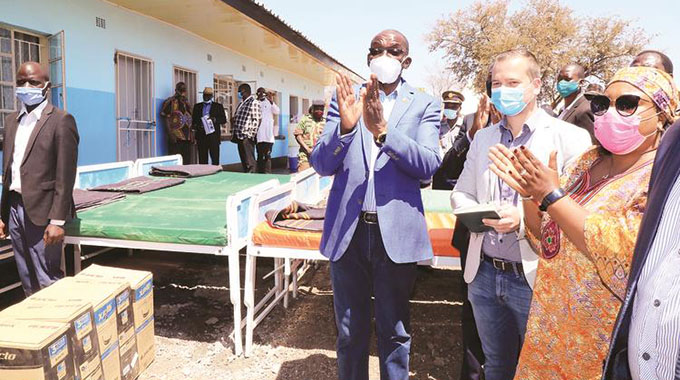Devolution: Where are we, what’s next?

Lovemore Chikova
Development Dialogue
The New Dispensation has set in motion the devolution process, which is provided for in the Constitution as one of the key pillars of development, with various activities being carried out to advance the concept.
It is important then for the generality of the population to understand where the Government is coming from, how it is implementing this concept and what it intends to achieve.
Politically, what needs to be made clear from the onset is that devolution does not make Zimbabwe a federal State, but will ensure the country continues to maintain its unitary State system.
In a unitary State system, the other only level of government apart from the central Government is either the local or municipal level whose powers are not accorded constitutional status.
In this system, the central Government makes a decision on which powers to devolve to the lower levels, and in the case of Zimbabwe, the Government is giving local councils, municipals and provinces the mandate to make decisions on developmental issues. A federal system entails that provincial governments have sovereignty, with powers to decide on a number of issues and making final decisions because of their autonomous status.
A misconception, which some held either ignorantly or deliberately for their own selfish purposes and tried to advance, was that devolution meant Zimbabwe would become a federal State.
That question was clarified unequivocally by the people during the work of the Constitution Parliamentary Select Committee which gathered views for the purposes of drafting the new Constitution. When it was put across on the way forward between a federal State and unitary State, the people went for a unitary State alongside implementation of devolution.
The preamble for the Constitution’s Chapter 14 states there will be devolution of power and responsibilities to lower tiers of government, but taking into cognisant desirability for “the preservation of national unity in Zimbabwe and the prevention of all forms of disunity and secessionism”.
The Constitution also mentions the desirability to ensure “the democratic participation in government by all citizens and communities in Zimbabwe” in light of devolution.
The desire is also to ensure “the equitable allocation of national resources and the participation of local communities in the determination of development priorities within their areas”.
There was a consensus during the constitution-making process that while the country is maintaining the unitary State system, there was still need to implement devolution to ensure that local communities are empowered to make development and economic decisions. In the process, the central Government will still be very much interested in the activities being carried out by the provinces and districts, with its technocrats offering technical advice.
What this means is that there should be constant interaction among the central Government, provincial structures and local government structures because the powers being devolved will still be superintendent by Government.
In working with the provincial and metropolitan councils, provincial ministers and the recently appointed provincial development coordinators will continue to carry out other functions that these councils cannot perform.
These functions include services that Government has traditionally offered to the people that are divorced from the developmental agenda of the province or the metropolitan area.
Section 264 (2) of the Constitution is clear on the specific goals and objectives of devolution. These are:
To give powers of local governance to the people and enhance their participation in the exercise of the powers of the State and in making decisions affecting them;
To promote democratic, effective, transparent, accountable and coherent government in Zimbabwe as a whole;
To preserve and foster the peace, national unity and indivisibility in Zimbabwe;
To recognise the right of communities to manage their own affairs and further their development;
To ensure equitable sharing of national and local resources;
To transfer responsibilities and resources from the national government in order to establish a sound financial base for each provincial and metropolitan council and local authority.
Where are we?
The Government has already started the first phase of devolution by availing financial resources to local authorities, which is channelled towards projects aimed at uplifting lives of the people.
In doing so, the purpose is to ensure that no area is left behind in terms of development, hence areas with more difficult conditions should receive more resources. The sectors that have been identified for immediate action include education, health, water, roads, electricity and social amenities, with projects being implemented in various districts.
In this respect, the Constitution compels the Government to direct funds from the national Budget towards enhancing devolution and these are the funds being already used in provinces and districts. In 2019, the Government availed $703 million in the national Budget towards devolution, while the figure increased to $2.9 billion in this year’s Budget.
A number of rural and urban councils which received the funds have since embarked on various projects within the guidelines from the central Government, which are aimed at improving the people’s lives. Schools, clinics and dams have been built in various areas, while roads, water and sewer works are being carried throughout the country using the funds disbursed under devolution.
What next?
Some may ask why it is the Government’s concern to avail the funds for devolution to the local authorities. What the Government is doing is establishing building blocks for devolution by hand-holding the rural and metropolitan councils in their first steps towards reaching their potential.
It is expected that in the near future, Government will only avail funds for devolution to critical areas, leaving the provincial structures with the burden to raise their own funds for development.
This places a huge responsibility on those responsible for leading development trajectories within their jurisdiction, as they will be called upon to be innovative by coming up with projects that enhance the provinces’ Gross Domestic Product. Very soon, it will not be enviable to become a provincial minister, a provincial development coordinator or a leader at any other lower tier of governance because questions will be constantly asked on performances.
Regular assessments are expected to be made on the province’s performances and the leaders taken to task, especially if they fail to meet targets.
This calls for leaders at the local level to starting thinking hard on what projects they can successfully undertake to ensure they enhance the development of their areas in a way that benefits everyone.
Provincial and Metropolitan Councils
The setting up of provincial and metropolitan councils has been delayed after a realisation that there were contradictions on their composition.
This led to amendments being included in the Constitution of Zimbabwe Amendment Bill No 2, whose Clauses 20, 21, 22 and 25 seek to remove members of Parliament from membership of the provincial council.
Senators and National Assembly members will also not qualify to be members of metropolitan councils.
Section 268 of the Constitution of Zimbabwe (Chapter 14) had provided that Senators and National Assembly members be part of the provincial and metropolitan councils mandated with spearheading provincial economies under devolution.
The Bill is still being debated in the National Assembly. It was realised as a serious anomaly in that Members of Parliament superintend over the same developmental budgetary programmes through the Public Accounts committee. This was tantamount to having an oversight over their activities since they would have received and allocated the funds from the national budget through the provincial and metropolitan councils.
Duties of the provincial and metropolitan councils are mainly anchored on their responsibility for the social and economic development of a province.
They are specifically listed as:
Planning and implementing social and economic development activities in its province;
Co-ordinating and implementing governmental programmes in its province;
Planning and implementing measures for the conservation, improvement and management of natural resources in its province;
Promoting tourism in its province, and developing facilities for that purpose;
Monitoring and evaluating the use of resources in its province and;
Exercising any other functions, including legislative functions, that may be conferred or imposed on it by or under an Act of Parliament.










Comments